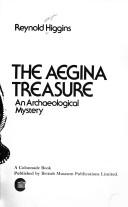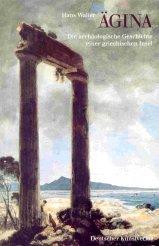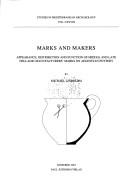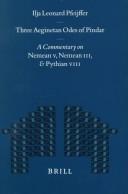| Listing 1 - 10 of 10 |
Sort by
|
Book
ISBN: 9021414074 Year: 1977 Publisher: Amsterdam : Querido,
Abstract | Keywords | Export | Availability | Bookmark
 Loading...
Loading...Choose an application
- Reference Manager
- EndNote
- RefWorks (Direct export to RefWorks)
Dutch literature --- Kossmann, Alfred --- Homes and haunts --- Aegina Island (Greece) --- Aigina Island (Greece) --- Dímos Aíginas (Greece) --- Egina (Greece : Municipality) --- Engia (Greece : Municipality) --- Nísos Aígina (Greece) --- Nísos Aíyina (Greece) --- Αίγινα (Greece : Municipality) --- Description and travel.
Book
ISBN: 1438464827 9781438464824 9781438464817 Year: 2017 Publisher: Albany, [New York] : SUNY PRESS,
Abstract | Keywords | Export | Availability | Bookmark
 Loading...
Loading...Choose an application
- Reference Manager
- EndNote
- RefWorks (Direct export to RefWorks)
The controversial removal of the Parthenon sculptures from Greece to England in the first decade of the nineteenth century by Thomas Bruce, seventh Earl of Elgin, sparked an international competition for classical antiquities. This volume tells a lesser-known chapter of that story, concerning sculptures from the Temple of Aphaia on the Greek island of Aegina. Discovered in 1811 as the Parthenon project was nearing its completion, these ancient sculptures were acquired at auction by Johann Martin Wagner (1777–1858) on behalf of Crown Prince Ludwig of Bavaria. The sculptures turned out to be significant in a number of ways, offering important evidence for a transitional period of Greek art between the archaic and classical eras, for the existence of an independent Aeginetan school that was the equal of Athenian art at the time, and for Greek sculptures having been elaborately painted and adorned.Originally published in 1817 and presented here for the first time in English, this book reproduces the report commissioned by the crown prince that was written by Wagner and edited by F. W. J. Schelling and contained richly detailed descriptions of the sculptures. In addition, Louis A. Ruprecht Jr. provides a comprehensive historical introduction featuring a constellation of intellectual figures, an afterword, notes, appendices, and more than forty images to tell the fascinating story of the sculptures and their legacy from excavation to the present day.
Aeginetan marbles. --- Ludwig --- Ludwig I van Beieren, --- Ludwig di Baviera, --- Ludwig I di Wittelsbach, --- Ludovico I di Baviera, --- Art collections. --- Aigina (Greece : Municipality) --- Aegina Island (Greece) --- Aigina Island (Greece) --- Dímos Aíginas (Greece) --- Egina (Greece : Municipality) --- Engia (Greece : Municipality) --- Nísos Aígina (Greece) --- Nísos Aíyina (Greece) --- Αίγινα (Greece : Municipality) --- Antiquities. --- Louis --- Aeginetan sculptures

ISBN: 0714180068 9780714180069 Year: 1979 Publisher: London: British Museum,
Abstract | Keywords | Export | Availability | Bookmark
 Loading...
Loading...Choose an application
- Reference Manager
- EndNote
- RefWorks (Direct export to RefWorks)
Civilization, Mycenaean --- Civilisation mycénienne --- British Museum. --- Aegina Island (Greece) --- Greece --- Egine (Grèce : Ile) --- Grèce --- Antiquities --- Antiquités --- Civilisation mycénienne --- Egine (Grèce : Ile) --- Grèce --- Antiquités --- Mycenaean civilization --- Civilization, Aegean --- Aigina Island (Greece) --- Dímos Aíginas (Greece) --- Egina (Greece : Municipality) --- Engia (Greece : Municipality) --- Nísos Aígina (Greece) --- Nísos Aíyina (Greece) --- Αίγινα (Greece : Municipality) --- Antiquities. --- Aegina Island (Greece) - Antiquities --- Greece - Antiquities

ISBN: 3422061045 9783422061040 Year: 1993 Publisher: München: Deutscher Kunstverlag,
Abstract | Keywords | Export | Availability | Bookmark
 Loading...
Loading...Choose an application
- Reference Manager
- EndNote
- RefWorks (Direct export to RefWorks)
Aegina Island (Greece) --- -Excavations (Archaeology) --- -Antiquities --- Grèce --- -Antiquité --- -Archaeological digs --- Archaeological excavations --- Digs (Archaeology) --- Excavation sites (Archaeology) --- Ruins --- Sites, Excavation (Archaeology) --- Archaeology --- Antiquities --- Greece --- Antiquities. --- Excavations (Archaeology) --- Archaeological digs --- Aigina Island (Greece) --- Dímos Aíginas (Greece) --- Egina (Greece : Municipality) --- Engia (Greece : Municipality) --- Nísos Aígina (Greece) --- Nísos Aíyina (Greece) --- Αίγινα (Greece : Municipality) --- Aegina Island (Greece) - Antiquities --- Excavations (Archaeology) - - Aegina Island - Greece --- -Grèce - - Antiquité --- -Grèce --- -Aegina Island (Greece) --- -Grèce -
Book
ISBN: 0405140363 9780405140365 Year: 1981 Publisher: New York (N.Y.): Arno press,
Abstract | Keywords | Export | Availability | Bookmark
 Loading...
Loading...Choose an application
- Reference Manager
- EndNote
- RefWorks (Direct export to RefWorks)
Aegina Island (Greece) --- Economic conditions --- Social conditions --- Politics and government --- -Aegina Island (Greece) --- -Economic conditions --- Aigina Island (Greece) --- Dímos Aíginas (Greece) --- Egina (Greece : Municipality) --- Engia (Greece : Municipality) --- Nísos Aígina (Greece) --- Nísos Aíyina (Greece) --- Αίγινα (Greece : Municipality) --- Economic conditions. --- Politics and government. --- Social conditions. --- Aegina Island (Greece) - Economic conditions --- Aegina Island (Greece) - Social conditions --- Aegina Island (Greece) - Politics and government
Book
ISBN: 3406033334 Year: 1976 Publisher: München Beck
Abstract | Keywords | Export | Availability | Bookmark
 Loading...
Loading...Choose an application
- Reference Manager
- EndNote
- RefWorks (Direct export to RefWorks)
#BIBC:ruil
Book
ISBN: 0801842964 Year: 1991 Publisher: Baltimore, MD : Johns Hopkins University Press,
Abstract | Keywords | Export | Availability | Bookmark
 Loading...
Loading...Choose an application
- Reference Manager
- EndNote
- RefWorks (Direct export to RefWorks)
Aegina Island (Greece) --- -Athens (Greece) --- -Greece --- Greece --- History --- Colonies --- -History. --- -Aegina Island (Greece) --- Athens (Greece) --- Griechenland --- Grèce --- Hellas --- Yaṿan --- Vasileion tēs Hellados --- Hellēnikē Dēmokratia --- République hellénique --- Royaume de Grèce --- Kingdom of Greece --- Hellenic Republic --- Ancient Greece --- Ελλάδα --- Ellada --- Ελλάς --- Ellas --- Ελληνική Δημοκρατία --- Ellēnikē Dēmokratia --- Elliniki Dimokratia --- Grecia --- Grčija --- Hellada --- اليونان --- يونان --- al-Yūnān --- Yūnān --- 希腊 --- Xila --- Греция --- Gret︠s︡ii︠a︡ --- Aigina Island (Greece) --- Dímos Aíginas (Greece) --- Egina (Greece : Municipality) --- Engia (Greece : Municipality) --- Nísos Aígina (Greece) --- Nísos Aíyina (Greece) --- Αίγινα (Greece : Municipality) --- History.

ISBN: 9170811792 9789170811791 Year: 2001 Volume: vol. 128 Publisher: Jonsered: Åström,
Abstract | Keywords | Export | Availability | Bookmark
 Loading...
Loading...Choose an application
- Reference Manager
- EndNote
- RefWorks (Direct export to RefWorks)
Ancient pottery --- Antieke ceramiek (Oudheid) --- Ceramiek [Antieke ] (Oudheid) --- Ceramiek [Oude ] (Oudheid) --- Ceramiek van de oudheid --- Céramique ancienne (Antiquité) --- Céramique de l'antiquité --- Pottery [Ancient ] --- Pottery --- Pottery, Ancient. --- Bronze age --- Pottery, Aegean --- Céramique --- Céramique antique --- Age du bronze --- Céramique égéenne --- Marks. --- Marks --- Marques --- Aegina Island (Greece) --- Greece --- Egine (Grèce : Ile) --- Grèce --- Antiquities. --- Antiquités --- Pottery, Greek --- -Bronze age --- -Pottery --- -Pottery, Greek --- -Greek pottery --- Classical antiquities --- Pottery, Classical --- Ceramic art --- Ceramics (Art) --- Chinaware --- Crockery --- Earthenware --- Pottery, Primitive --- Ceramics --- Decorative arts --- House furnishings --- Firing (Ceramics) --- Saggers --- Civilization --- Antiquities --- -Antiquities --- Céramique --- Céramique antique --- Céramique égéenne --- Egine (Grèce : Ile) --- Grèce --- Antiquités --- Greek pottery --- Aigina Island (Greece) --- Dímos Aíginas (Greece) --- Egina (Greece : Municipality) --- Engia (Greece : Municipality) --- Nísos Aígina (Greece) --- Nísos Aíyina (Greece) --- Αίγινα (Greece : Municipality) --- Pottery [Aegean ] --- Pottery - Greece - Aegina Island - Marks. --- Pottery, Greek - Greece - Aegina Island. --- Bronze age - Greece - Aegina Island.
Book
ISBN: 9789004288003 9789004289673 9004288007 9004289674 Year: 2016 Volume: 389 Publisher: Leiden, Netherlands ; Boston, [Massachusetts] : Brill,
Abstract | Keywords | Export | Availability | Bookmark
 Loading...
Loading...Choose an application
- Reference Manager
- EndNote
- RefWorks (Direct export to RefWorks)
Through intensive surveys of three fortifications in late Roman Greece, Frey reveals the untapped potential of spolia in demonstrating the critical role played by non-elites in bringing about the architectural and social changes that mark the end of classical antiquity. As his analysis demonstrates, when studied less as displaced objects to be classified by type and more as evidence for the construction process itself, spolia offer a unique opportunity to examine the ways in which common builders met the challenge of using pre-existing building materials to meet their contemporary architectural needs. This “bottom-up” approach offers an alternative to the traditional view that attributes change and innovation only to the genius of prominent individuals known to us in historical sources.
Fortification --- Aegina Island (Greece) --- Isthmia (Greece) --- Sparta (Extinct city) --- History --- Antiquities --- Building materials --- Greece --- Recycling --- History, Military --- Fortifications grecques --- Egine (Grèce : Ile) --- Isthmia (Grèce) --- Sparte (Ville ancienne) --- Fortification. --- Aigina (Greece : Municipality) --- Isthmía (Greece) --- Sparta (Extinct city). --- Histoire militaire. --- Egine (Grèce : Ile) --- Isthmia (Grèce) --- Antiquities. --- Fortifications --- Construction --- Recycling. --- Histoire --- Matériaux --- Recyclage --- To 1500. --- Greece. --- Grèce --- Fortification, Greek --- Matériaux --- Grèce --- Antiquités --- Histoire militaire --- Architectural materials --- Architecture --- Building --- Building supplies --- Buildings --- Construction materials --- Structural materials --- Materials --- Fortification, Primitive --- Forts --- Military engineering --- Siege warfare --- Isthmía (Greece) --- Lacedaemon (Extinct city) --- Lakedaímon (Extinct city) --- Sparta (Ancient city) --- Kirás Vrísi (Greece) --- Aigina Island (Greece) --- Dímos Aíginas (Greece) --- Egina (Greece : Municipality) --- Engia (Greece : Municipality) --- Nísos Aígina (Greece) --- Nísos Aíyina (Greece) --- Αίγινα (Greece : Municipality) --- Fortification - Greece - History - To 1500 --- Aegina Island (Greece) - Antiquities --- Isthmia (Greece) - Antiquities --- Building materials - Recycling - Greece - History - To 1500 --- Greece - History, Military - To 146 B.C.

ISBN: 9004113819 9004351248 9789004113817 9789004351240 Year: 1999 Volume: 197 Publisher: Leiden ; Boston : Brill,
Abstract | Keywords | Export | Availability | Bookmark
 Loading...
Loading...Choose an application
- Reference Manager
- EndNote
- RefWorks (Direct export to RefWorks)
A study of three epinicia of Pindar, which have in common that they celebrate victories of Aeginetan athletes and that they respond to the contemporary political situation in Aegina and to circumstances of the victory. The primary objective of this book is to provide an interpretation of each of the three odes as meaningful, coherent works of the literary art. For each ode, it provides a commentary in which problems of text and interpretation are discussed in detail, a structural and metrical analysis, and an interpretative essay, in which the observations of detail are brought together in order to provide an answer to the question as to how the ode at hand could have functioned as a coherent, meaningful epinicion . The introduction addresses questions of method and provides a description of Pindar's style.
Athletics in literature --- Athlétisme dans la littérature --- Atletiek in de literatuur --- Games in literature --- Greek mythology in literature --- Griekse mythologie in de literatuur --- Jeux et récréations dans la littérature --- Mythologie [Griekse ] in de literatuur --- Mythologie grecque dans la littérature --- Mythology [Greek ] in literature --- Spelen in de literatuur --- Laudatory poetry, Greek --- Mythology, Greek, in literature --- Lyric poetry --- Athletics --- Poésie élogieuse grecque --- Poésie lyrique --- Sports athlétiques --- History and criticism --- Poetry --- Histoire et critique --- Poésie --- Pindar --- Criticism and interpretation. --- Aegina Island (Greece) --- Egine (Grèce : Ile) dans la littérature --- In literature --- Mythology, Greek, in literature. --- Odes, Greek --- Athletics in literature. --- Games in literature. --- History and criticism. --- -875 PINDARUS --- Odes --- -Lyric poetry --- Greek laudatory poetry --- Greek poetry --- Griekse literatuur--PINDARUS --- -Pindar --- Pindarus --- Pindare --- Pindaro --- Πίνδαρος --- Criticism and interpretation --- -In literature --- Pindar. --- In literature. --- -History and criticism --- 875 PINDARUS Griekse literatuur--PINDARUS --- -Greek laudatory poetry --- Píndaro --- Pindaros --- Poésie élogieuse grecque --- Mythologie grecque dans la littérature --- Poésie lyrique --- Sports athlétiques --- Poésie --- Egine (Grèce : Ile) dans la littérature --- 875 PINDARUS --- Greek odes --- Aigina Island (Greece) --- Dímos Aíginas (Greece) --- Egina (Greece : Municipality) --- Engia (Greece : Municipality) --- Nísos Aígina (Greece) --- Nísos Aíyina (Greece) --- Αίγινα (Greece : Municipality) --- Laudatory poetry [Greek ] --- Laudatory poetry, Greek. --- Literature. --- Odes, Greek. --- Belles-lettres --- Western literature (Western countries) --- World literature --- Philology --- Authors --- Authorship --- Nemean odes (Pindar) --- Pythian odes (Pindar) --- Pythia (Pindarus) --- Pythionikai (Pindar) --- Pythionikoi tou Pindarou (Pindar) --- Pindarou Epinikoi Nemeonikais (Pindar) --- Epinikoi Nemeonikais (Pindar) --- Nemean odes of Pindar (Pindar) --- Aigina (Greece : Municipality) --- Greece --- Laudatory poetry, Greek - History and criticism. --- Odes, Greek - History and criticism.
| Listing 1 - 10 of 10 |
Sort by
|

 Search
Search Feedback
Feedback About UniCat
About UniCat  Help
Help News
News